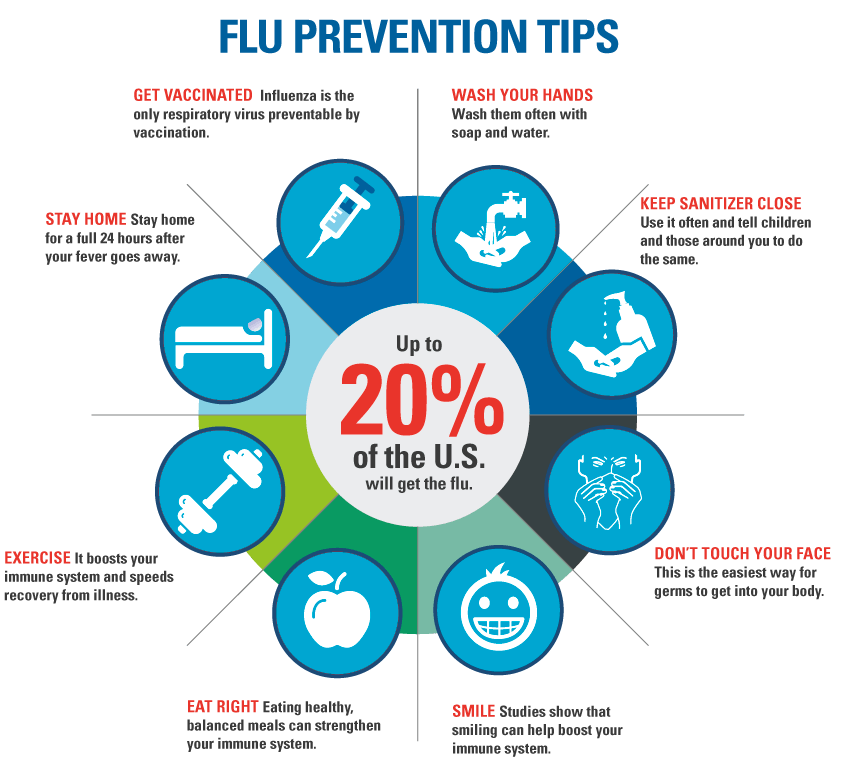In March 2019, the World Health Organisation launched the Global Influenza Strategy for 2019-2030. It is an initiative which aims to increase global preparedness and fight the threat of influenza worldwide. Symptoms of influenza include sudden high fever, cough, headache, muscle and joint pain, sore throat and runny nose. In high risk groups, influenza can cause serious illness or death. In order to prevent the spread of influenza, vaccination is key. An established flu vaccination is currently being tested in children aged 6 months to 9 years. Read on to learn more about influenza and the new vaccine being trialed and use #GlobalInfluenzaStrategy to share this on social media.
Seasonal influenza
In Australia, influenza is responsible for more deaths each year than motor vehicle accidents – approximately 1500 to 3500 per year.
Those most at risk are the very young (less than 5 years of age) and the elderly. In 2017, 32% of hospitalisations for influenza in Australia were for those less than 2 years of age.
Children are 20-50% more likely to contract influenza compared with 10-30% of adults. In addition, otherwise healthy children under 5 years of age are the most likely group to be hospitalised due to flu complications.
Death can occur in approximately half of those needing ICU admission and approximately 50% of these children were otherwise healthy prior contracting the flu. In 2015 a study found that approximately 7% of children admitted to hospital required intensive care. Only 12% of these children had received the flu vaccine that year.
What is Influenza?
Influenza is an extremely contagious respiratory disease caused by viruses (Influenza A and B). In 2018, the majority of flu in Australia was due to Influenza A (53%), but this does vary by season.
What are the symptoms of the flu and how do I know that I have it?
It can be easy to confuse flu symptoms with having a cold.
Symptoms of a cold include having a sore throat, mild fever, cough, having a blocked or running nose and sneezing. In general, colds are usually mild and self-limiting, requiring little or no treatment.
Flu symptoms, however, usually include symptoms of a cold, as well as headaches, muscle aches, joint pain and fatigue (feeling very tired). Some people may have vomiting and diarrhoea, although this is more common in children than adults. These symptoms can last anywhere from one to two weeks.
I have the flu. What can I do to treat it?
Simple things that you can do at home include:
- getting plenty of rest
- keeping hydrated and drinking plenty of water
- maintaining a healthy diet.
Medications that can help include:
- simple over the counter pain relievers such as paracetamol (eg Panadol) and/or Ibuprofen (eg Nurofen)
- saline nasal sprays, nasal decongestant sprays (not to be used in children less than 6 years)
- cold and flu medications (usually not recommended under the age of 11)
- antiviral medications (prescribed by your doctor) ie. Tamiflu, Relenza. These can reduce the duration of your symptoms and provide some relief to your symptoms
- antibiotics are not recommended because influenza is a viral illness. If you do experience complications such as a bacterial chest infection due to the flu, then you may be prescribed antibiotics to treat this
It is important to take extra care during flu season (usually during winter) as influenza is extremely contagious. Be aware that the influenza virus is robust and can survive:
- more than an hour in enclosed environments (in the air), and
- greater than 8 hours on hard surfaces.
How to reduce the risk of developing or passing on the flu:
- Vaccination
- Regular hand washing
- Staying home if you are unwell and avoiding crowds during flu season
- Covering your mouth and nose when sneezing or coughing

The best way to minimise your risk of getting the flu is having an annual flu vaccination.
There are several flu vaccines available in Australia each year. The reason that you need to have it annually is because the strains of flu change from year to year. In general, the usual widely available vaccine (‘quadrivalent’) covers you against 4 strains of flu (covering 2 A and 2 B strains). There is another vaccine high dose (‘trivalent’) that is funded by the Federal Government for those over the age of 65 years (covering 2 A and 1 B strain).
In 2018, the Queensland Government made the decision to provide the influenza vaccine free of charge to children aged between 6 months and 5 years. This is in addition to other special risk groups:
- Adults over the age of 65 years
- Indigenous Australians
- Pregnant women
- Those over the age of 6 months with medical conditions that put them at higher risk of developing influenza – ie those with severe asthma, lung, heart disease, or impaired immunity
In general, you only need to get one dose of the vaccine each year. The exception is in children under the age of 9 years receiving the flu vaccine for the very first time. These children require two vaccinations at least one month apart.
It is best to aim to get the vaccine at least 3 months before the peak flu season (June to September) but it is never too late to get the vaccine, as influenza can be present the whole year round.
At present there are 4 free vaccines available in Australia for children. These are:
- FluQuadri Junior – for children aged 6 to 35 months
- FluQuadri and/or Fluarix Tetra – for people aged 3 to 64 years
- Alfuria Quad – for people aged 5 and older
Other vaccines are available for people aged 65 years and over – Fluad, Fluzone High Dose and Influvac Tetra.
Concerns regarding the flu vaccine in young children:
In 2010 there were reports of febrile convulsions (convulsions associated with fever) associated with one brand of flu vaccine (Fluvax). This was noted to occur primarily in the under 5 years age group. Following an investigation by the TGA (Therapeutic Goods Administration) Fluvax administration was suspended in this age group.
What are the side effects of the flu vaccine?
Common side effects that patients may experience include:
- drowsiness, lethargy
- muscle aches
- localised pain, redness and swelling at the site of injection
- low grade fever
Most of these side effects are mild and do not need any specific treatment. Symptoms such as aches and fever can usually be treated with simple pain relievers, such as paracetamol or ibuprofen.
If your symptoms are worrying or worsening, you should return to see your doctor or health care provider.
Severe, life threatening side effects:
As with any medication or vaccine there is a small risk of a serious allergic reaction (anaphylaxis). This usually occurs within the first few minutes or receiving the vaccine which is why it is recommended that you stay in the clinic for up to 30 minutes after immunisation.
Another serious side effect is Guillain-Barre Syndrome (rapidly progressive muscle weakness caused by the immune system damaging the peripheral nervous system). The risk of this limited to approximately 1 in 1,000,000.
You may have heard of people getting the flu from the vaccine. Is this true or a myth?
The flu vaccine contains inactivated influenza virus so you can’t get the flu from the vaccine. If you do get sick after the vaccine odds are that this is coincidental and that you were likely infected prior to getting the vaccine.
I’ve decided to get the flu vaccine for myself and/or my child. What should I do next?
Talk to your health care provider (this could be your local GP) about getting the flu vaccine. Your GP will be able to advise you which vaccine is most suitable for you or your child (taking into consideration your age, other health issues and allergies).
You can get the government funded flu vaccine (if you meet the criteria outlined above) through your health care provider. This is usually though your local GP or other providers, such as your local pharmacy. Some workplaces provide this vaccine free of charge to their employees, so it is worthwhile checking with your employer if they provide this service.
If you don’t meet the government criteria you can still get the vaccine for a private fee. The cost of this varies from clinic to clinic.
Children’s Flu Vaccine Study
Here at AusTrials, we will soon be starting to recruit volunteers for a study involving an established flu vaccine for children aged 6 months to 9 years of age. This would be provided to your child free of charge and would involve either one or two visits to the clinic (depending on whether your child has had the vaccine in previous years).
This study is looking at the effects of the vaccine in 2 different age groups:
- 6 months to less than 3 years of age
- 3 years to less than 9 years of age
The study vaccine is being manufactured by Seqirus, the makers of the current flu vaccine (Afluria Quad), which is on the market in Australia.
Every child who is enrolled into this study will receive the flu vaccine (there is no placebo).
For more information regarding this study please contact us on 07 3278 5255, by email to info@momentumclinicalresearch.com.au or by clicking on the ‘Studies’ page of our website.
Potential participants under 18 years must be accompanied by a parent or a legal guardian at all study visits, who must consent to study participation.

